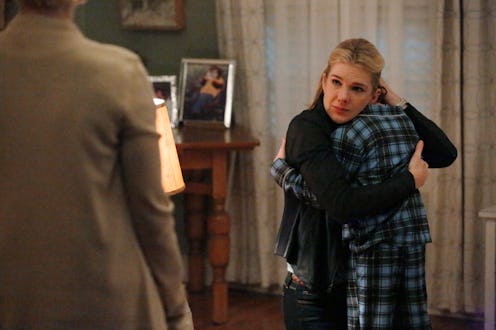Entertainment
'The Whispers' May Expand On 'Zero Hour's Twist

The summer series The Whispers boasts a strong connection to producer Steven Spielberg and his ability to draw both wonder and suspense from childhood. But rather than Poltergeist or E.T., The Whispers is based on Zero Hour, a Ray Bradbury short story from 1951 about suburban kids whose vaguely threatening games turn out to have serious significance. ABC is raising the stakes of the story, adding in American Horror Story's Lily Rabe as an FBI agent who's investigating children across the country as they start to play games with the same imaginary friend named "Drill." In the story, this is all from the POV of a suburban mother, Mrs. Morris, as she watches over her daughter, Mink, playing this game. But it doesn't stop there, and if you're curious about where the show might be going, read on for some spoiler-y discussion of what happens in Bradbury's text.
The big twist in Zero Hour is the revelation that the invasion game and the "imaginary" friend Drill are actually carrying out an alien invasion, welcomed into various homes by all young children under 10 years old. Everything is kept purposely vague in order to maximize how little the Morris family understands about what's happening, until they're forced to realize that what seemed to be a game for their children is real. The fearful tone and shocking truth of this realization are evident in the passage from Zero Hour below.
All the subconscious suspicion and fear that had gathered secretly all afternoon and fermented like a wine in her. All the little revelations and knowledges and sense that had bothered her all day and which she had logically and carefully and sensibly rejected and censored. Now it exploded in her and shook her to bits.
The whole story has a determined strangeness and oddity that feels like a Twilight Zone episode. And it has the twist ending to match — how many times did that show have "aliens!" as a punchline? While the story is incredibly simple, it's really all about the surprise at the end. That's not how television shows work... except for, I guess, the real Twilight Zone.
There's not much more to the original short story than that suspenseful ending, other than the metaphorical underpinnings of how children can often be more perceptive than adults, and how easily childhood games can be dismissed. But the story stops as soon as the audience knows just what is going on. The show, presumably, will dive more deeply into both Bradbury's themes and the plot of the actual alien attack — if it keeps the same twist.
The biggest departure from the story so far is that The Whispers' central character is an FBI agent and mother, rather than a stay-at-home mom. In the story, the whole point is how innocuous everything begins, while in the show, the stakes are much higher from the beginning. And to fit in with the 24-hour news cycle that we all recognize today but didn't exist when Zero Hour was published, there's much more urgency. So the game isn't just innocent fun until the explosive ending, but a series of escalating, increasingly dangerous acts. There could also be success in going past the end of the story, at the "Zero Hour" when the aliens arrive. Because these aliens sound terrifying:
They trembled together in silence in the attic, Mr. and Mrs. Morris. For some reason the electric humming, the queer cold light suddenly visible under the door crack, the strange odor and the alien sound of eagerness in Mink’s voice finally got through to Henry Morris too. He stood, shivering, in the dark silence, his wife beside him.
While the Morris family's story ends, this "invasion" is just beginning. I find it hard to believe that The Whispers will end on the pivotal moment displayed in the ending of Zero Hour. If anything, the FBI presence insinuates that there might be a larger conspiracy at work, while Bradbury's story is all about the idea that there may be things that only children can understand that still threaten all of us. Those themes that Bradbury explored will be the core to turning a short story into a full-length television series.
Images: Kelsey McNeal/ABC; Giphy